 |
President Vo Van Thuong speaks at the Japanese Parliament. (Photo: VNA)
Dear Speaker of the House of Representatives Nukaga Fukushiro,
Dear President of the Senate Otsuji Hidehisa,
Dear Members of the Japanese National Diet,
I would like to express my sincere gratitude to you for giving me the honor to speak at the Japanese National Diet - the oldest legislative body in Asia, which has made many important legislative decisions for Japan's development over the past 135 years. This is a special sentiment that you have shown to the Vietnamese people, the high-ranking Vietnamese delegation that I represent, at a very meaningful time - the 50th anniversary of the establishment of diplomatic relations (1973-2023) between our two countries.
On behalf of the State and People of Vietnam and with my personal feelings, I would like to send to the Members of the National Assembly and the People of Japan my warmest greetings. I sincerely thank you for the solemn and warm welcome given to me and the high-ranking Vietnamese delegation.
Ladies and Gentlemen,
Since I was young, I had the opportunity to visit your country in the exchange program, meeting Vietnamese - Japanese youth. Those visits, meeting Japanese youth, living with Japanese families have left me with good memories and impressions of the hospitable and friendly Japanese people; the Japanese country is as beautiful as cherry blossoms, the Japanese soul is as peaceful and profound as Haiku poems, the Japanese spirit is as resilient and noble as Samurai warriors, the Japanese will is as steadfast and firm as Mount Fuji.
Until today, during this visit to Japan, although in a new position, I still keep in my heart the good memories of nearly 30 years ago when I visited Japan. At the same time, I have a deeper feeling about the Land of the Rising Sun, which is developing and becoming rich, with an increasingly high position in the international arena; Japan is always a reliable partner, a close friend, always supporting and helping Vietnam on the path of building and developing the country, together contributing to peace, stability and prosperity in the region and the world.
In today's meaningful meeting, I would like to share with you some basic contents about the relationship between our two countries; the vision for the future and the position of that relationship for the two peoples, as well as for peace, cooperation and development in the region and the world.
Ladies and Gentlemen,
1. The relationship between the Vietnamese and Japanese peoples.
Our two countries and peoples have a long-standing historical relationship dating back more than 1,000 years. It started with people-to-people exchanges, then political, diplomatic, and economic cooperation. According to historical research, in the 8th century, Vietnamese monk Phat Triet came to Nara province to attend the ceremony to open the eyes of the great Buddha statue, opening the history of exchanges in Buddhism and Royal Court Music between the two countries. In the 16th century, Japanese Red Seal Ships came to Vietnam to trade and do business, establishing streets and bridges with strong Japanese architecture, which are still preserved in Hoi An today. That was the relationship between Princess Ngoc Hoa and Merchant Araki Sotaro; it was the beautiful friendship between patriotic scholar Phan Boi Chau and Doctor Asaba Sakitaro...
Vietnam and Japan have the same wet rice civilization, and both have had to overcome the harsh challenges of nature and the devastation of war. From that, they have forged people with the virtues of resilience, indomitability, diligence, dynamism, creativity, valuing the values of community and family harmony, loyalty, affection before and after, respecting ancestors, filial piety to parents, always aiming for the values of truth - goodness - beauty to perfect personality.
Vietnamese patriot Phan Boi Chau stated that Vietnam and Japan are two countries with “the same culture, the same race, the same continent”. Although not geographically close, the two countries have many similarities and connections in culture, history, and people. The similarities in culture, history, people, and the tradition of close exchanges between the two peoples over thousands of years have been the glue that binds the friendship and mutual understanding between the two peoples. If I were to use a very general, concise, and emotional sentence about the relationship between our two countries, I would say: “Heaven-ordained fate”.
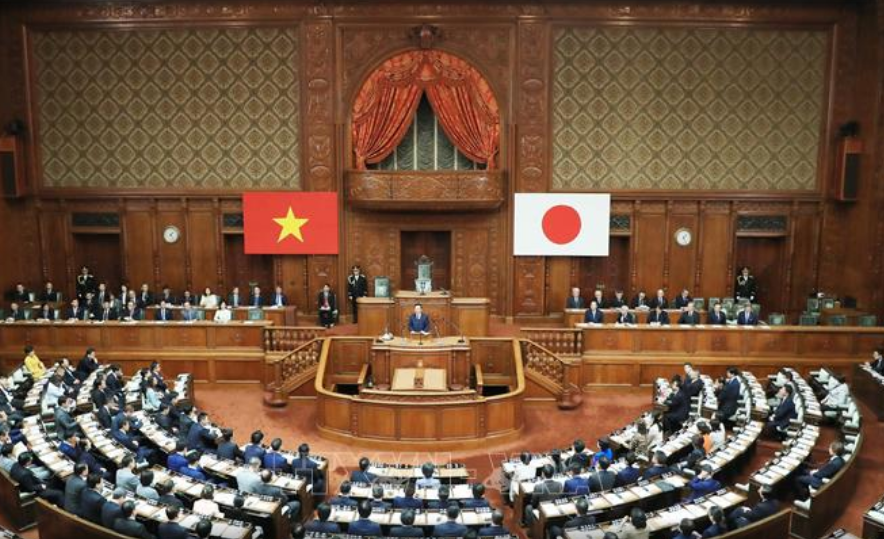 |
Ladies and Gentlemen,
2. Vietnam: Past, Present and Future
Our country has gone through long years of war to protect the Fatherland, to preserve the integrity of the country, to win the right to live, the right to freedom and the right to pursue happiness. The strength that helps the Vietnamese people overcome all difficulties to build and defend the country is the spirit of great justice and humanity of a nation that always loves peace, harmony, friendship and respect for other nations.
In a world of many changes, from the tradition and philosophy of our nation, from international experience, Vietnam has determined and consistently implemented the foreign policy: Independence, autonomy, peace, friendship, cooperation and development, diversification and multilateralization of foreign relations; proactively and actively integrating comprehensively and deeply into the international community; being a friend, a reliable partner and an active, responsible member of the international community. In that process, we determined that relations with neighboring countries are the top priority, relations with major countries and comprehensive strategic partners have strategic significance, relations with strategic partners, comprehensive partners, and a number of other partners are very important and attach importance to relations with traditional partners. Along with that, we implement the "four no's" defense policy: Not participating in military alliances; not allying with one country to fight against another; not allowing foreign countries to set up military bases or use territory against other countries; not using force or threatening to use force in international relations.
If in the past, Vietnam was known as a country of war and underdevelopment, today, after nearly 40 years of Doi Moi, Vietnam has become a country of peace, friendship, cooperation and development. We rank 35th in the world in terms of GDP, 5th in Asia and 20th in the world in terms of FDI attraction and trade exchange. Vietnam has participated in 16 bilateral and multilateral Free Trade Agreements (FTAs). The poverty rate according to the United Nations standards has decreased from over 50% (in 1986) to 4.3% (in 2022). Political stability, national defense and security have been consolidated and strengthened. Institutional reform, infrastructure development and human resource development have been promoted. Judicial reform, improving the effectiveness and efficiency of law enforcement, and anti-corruption have achieved many important results. Vietnam currently has diplomatic relations with 193 countries, including strategic or comprehensive partnerships with 30 countries; and is a member of 70 regional and global organizations.
We are striving to achieve the goal of Vietnam being a developed country with modern industry and high average income by 2030; and becoming a developed country with high income by 2045. To make that goal a reality, we value the role of the people with all human rights and civil rights as the center of policies and future planning. At the same time, we must try harder to overcome the difficulties and limitations that are hindering the country's development.
Vietnam admires the economic and social reform and development policies that have helped Japan become an economic power with an important role and position in the region and the world. The achievements of the Land of the Rising Sun are a great source of encouragement, useful experience and great motivation for Vietnam.
Ladies and Gentlemen,
3. Looking back at 50 years of Vietnam - Japan relations
Over the past 50 years, Vietnam and Japan have made steady progress in building a strong relationship between the two peoples. Since the two countries established diplomatic relations in 1973 and successively established the framework of the relationship from "Trusted and stable long-term partner" (2002) to the "Vietnam-Japan strategic partnership for peace and prosperity in Asia" (2009), upgraded to "Vietnam-Japan extensive strategic partnership for peace and prosperity in Asia" (2014), to today, political, economic, cultural and people-to-people cooperation between the two countries has been continuously expanded, contributing to raising the framework and content of the relationship, strongly promoting comprehensive cooperation between the two countries.
Japan is Vietnam's leading economic partner, the second largest partner in labor cooperation, the third in investment and tourism, and the fourth in trade. Defense and security cooperation is increasingly developing substantially and in depth. Currently, there are about 520,000 Vietnamese people living, working and studying in Japan; about 22,000 Japanese people living and working in Vietnam; nearly 100 pairs of localities have established friendly and cooperative relations. This is an important bridge to strengthen the relationship between Vietnam and Japan.
We have been effectively using Japan's ODA capital for Vietnam's socio-economic development. We cannot forget that, during Vietnam's most difficult time, Japan was one of the first developed countries to normalize relations and decided to resume ODA for Vietnam. And until now, Japan's ODA still plays a very important role in Vietnam's development.
In addition, the deep relationship between the leaders of the two countries, which has been painstakingly built and nurtured over many generations, has been a valuable asset in the Vietnam - Japan relationship. Right in the Japanese National Assembly, one-third of the parliamentarians are members of the Japan - Vietnam Parliamentary Friendship Union. They are an important bridge in the relationship between the two countries. I have been fortunate to meet and make friends with many of them in different positions. In particular, the visit of 1,000 delegates led by Mr. Nikai Toshihiro, Chairman of the Japan - Vietnam Parliamentary Friendship Union to Vietnam in 2020, is a rare event in the diplomatic history of the two countries.
It can be affirmed that the achievements in the Vietnam-Japan relationship over the past 50 years are a solid foundation for the two peoples to confidently move together into the future.
Ladies and Gentlemen,
4. The future of Vietnam-Japan relations
Vietnam and Japan have many advantages and strategic interests to complement each other. We have deep similarities in culture and people. We have created substantial and effective achievements in economic development, trade and investment. We have strong political determination and the common desire of the people of the two countries for peace, stability, a prosperous and happy life.
Two days ago, Prime Minister Kishida Fumio and I jointly issued a Joint Statement upgrading the bilateral relationship to a Comprehensive Strategic Partnership for Peace and Prosperity in Asia and the World. This is an important event, opening a new chapter in the Vietnam-Japan relationship to develop substantially, comprehensively, effectively, closely, meeting the interests of both sides, contributing to peace, stability, cooperation and development in the region and the world.
The new framework allows us to elevate and expand the space for cooperation, not only in bilateral relations but also on regional and global issues; not only in traditional areas but also in new areas of cooperation such as climate change response, clean energy, digital transformation, green FDI, green finance, new-generation ODA, in line with the spirit of the 2020-2030 Comprehensive Partnership.
Nhandan.vn


![[Photo] The 1st Congress of Phu Tho Provincial Party Committee, term 2025-2030](https://vphoto.vietnam.vn/thumb/1200x675/vietnam/resource/IMAGE/2025/9/30/1507da06216649bba8a1ce6251816820)
![[Photo] General Secretary To Lam, Secretary of the Central Military Commission attends the 12th Party Congress of the Army](https://vphoto.vietnam.vn/thumb/1200x675/vietnam/resource/IMAGE/2025/9/30/9b63aaa37ddb472ead84e3870a8ae825)

![[Photo] Solemn opening of the 12th Military Party Congress for the 2025-2030 term](https://vphoto.vietnam.vn/thumb/1200x675/vietnam/resource/IMAGE/2025/9/30/2cd383b3130d41a1a4b5ace0d5eb989d)
![[Photo] Panorama of the cable-stayed bridge, the final bottleneck of the Ben Luc-Long Thanh expressway](https://vphoto.vietnam.vn/thumb/1200x675/vietnam/resource/IMAGE/2025/9/30/391fdf21025541d6b2f092e49a17243f)
![[Photo] President Luong Cuong receives President of the Cuban National Assembly Esteban Lazo Hernandez](https://vphoto.vietnam.vn/thumb/1200x675/vietnam/resource/IMAGE/2025/9/30/4d38932911c24f6ea1936252bd5427fa)




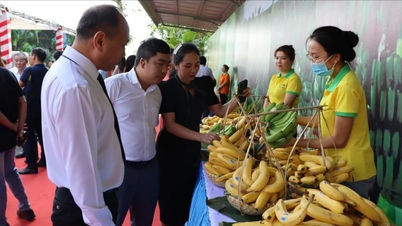



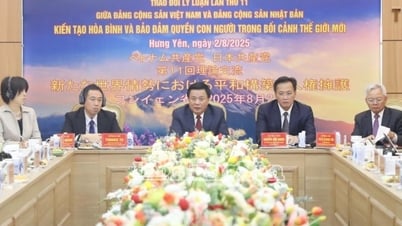
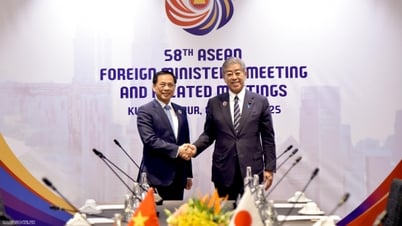




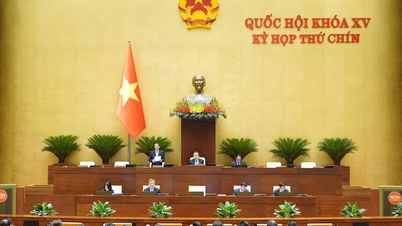
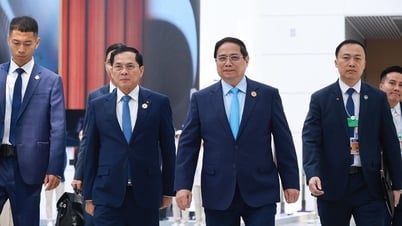
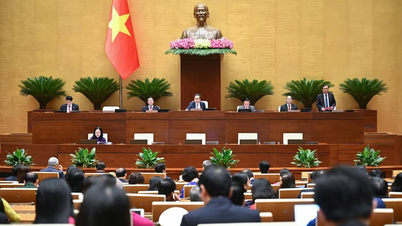

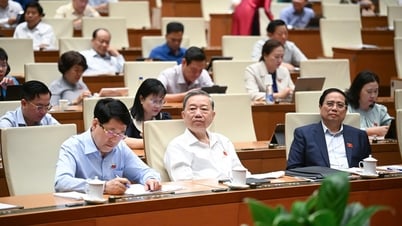





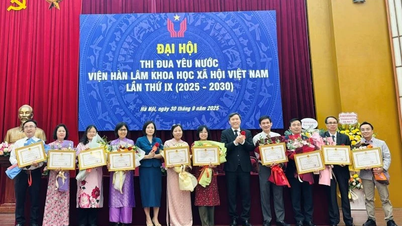
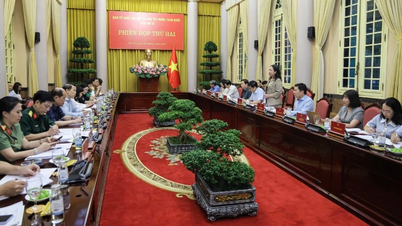
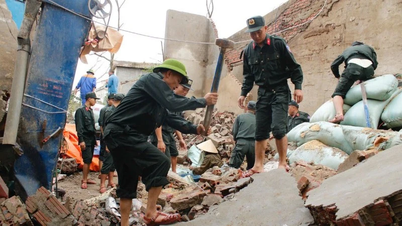
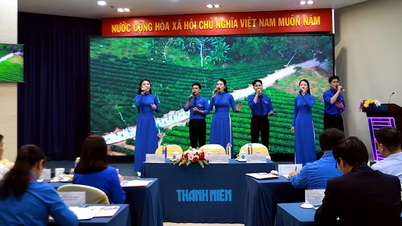
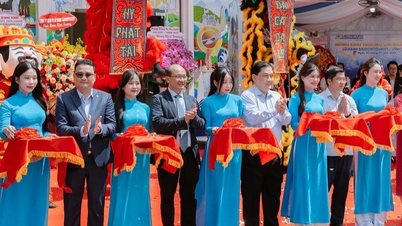
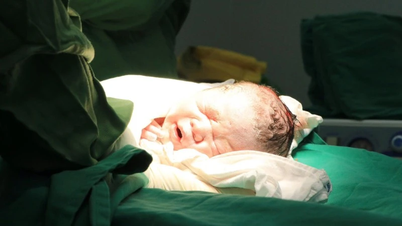





























































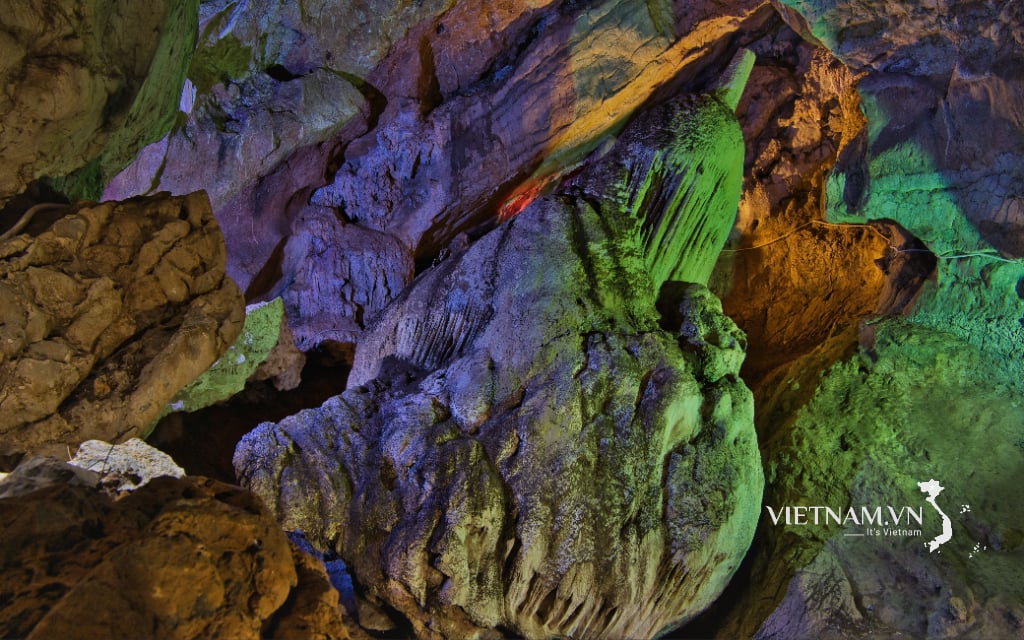
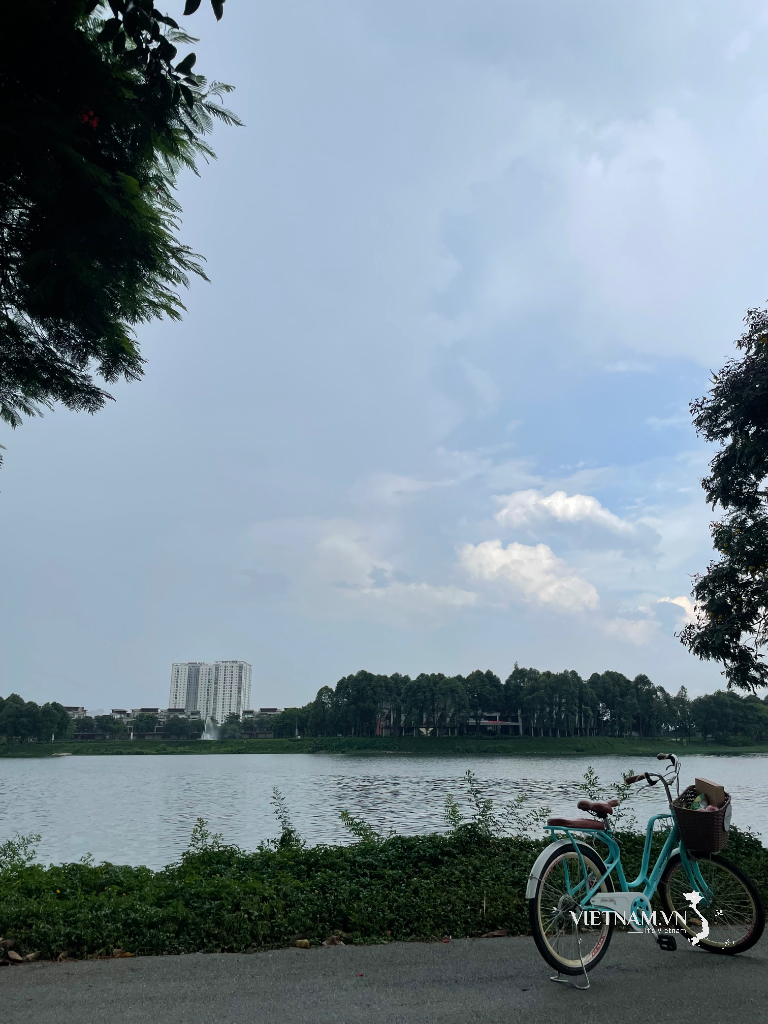


Comment (0)